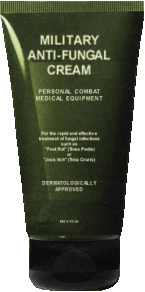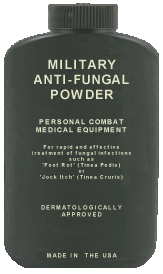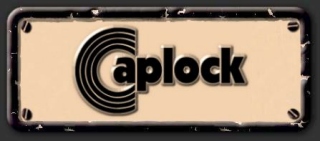Anti-fungal Treatment
for Combat Forces use Worldwide
Military
strength anti-fungal treatment for infections such as Tinea Pedis (Athlete's Foot), Tinea
Cruris (Jock Itch) or Tinea Corporis (Ringworm), to bring fast and lasting relief to soldiers suffering
from uncomfortable and morale deflating fungal skin irritations
often caused by constantly wearing sweaty, wet or damp clothing in extreme
environments.
 
Combat
troops have a duty to remain fit, healthy and ready for action at
all times; in fact it is a chargeable offence no less, to suffer
from any preventable fungal infection such as "Jock Itch","Foot Rot", Ringworm or Candida and
be rendered unfit for duty.
Fungal infections are a common complaint suffered by combat troops operating in
warm, damp or wet environments. Jock itch, also known as Tinea cruris,
is a fungal infection of the groin, inner thigh, buttocks or genitals
and is characterized by an itchy, red and often circular-shaped
rash in moist body areas. Foot Rot, or Athlete's Foot, is a fungal infection of the foot from a fungi called dermatophytes, which causes Tinea Pedis. Infection is characterized by scaling, maceration, and fissures most commonly in the web space between the 4th and 5th toes. Tight-fitting, non-porous military boots often compress the toes, creating a warm, moist environment in the web spaces. The infecting fungus often interacts with bacteria causing a more severe infection that extends onto the whole of the foot and even under the nails. With this type of athlete’s foot, itching is typically most intense when the socks and boots are removed.
A
warm or moist environment is the perfect place for the fungus to
grow. Anything
that enhances that warm, wet, or damp environment puts the soldier
at risk of getting a fungal infection. Therefore, wearing sweaty, wet clothing
or undergarments in hot or humid conditions, or wearing several layers of clothing
in cold climates causes an increased incidence of fungal infection. Men
are often affected more than women.
Military Anti-fungal Treatments are
anti-fungal products specifically designed for soldiers on
operational duties in extreme environments throughout the World
and will bring fast, effective and lasting relief from uncomfortable
fungal infections in the groin and/or foot areas. The Anti-fungal Cream and Anti-fungal Powder both
contain Miconazole Nitrate and the formulations, designed by one of North Americas leading Pharmaceutical, Health and Personal Care Industry Research & Development teams, are proven to have the maximum effect against
fungal infections in the minimum amount of time. Dermatological tests have shown a complete cure from 8 to 14 days.
Fungal infections such as "Jock itch" or Foot rot" are
best treated with topical cream or powder containing Miconazole Nitrate since the fungi can only live on the dead layer of keratin protein on top of the skin. Many "cosmetic" type ointments or powders can
be bought over-the-counter from pharmacy outlets, but these treatments
are not designed to cope with the rigours encountered by military
personnel on operational duty.
Military Anti-fungal Cream or Powder Treatments
for combat troops rapidly feel dry to the touch once applied to
the affected areas of the body, thus bringing fast pain relief and
alleviating any lingering uncomfortable stickiness often associated
with lesser "over-the-counter" creams, powders, sprays or ointments.
-
Contains Miconazole Nitrate for fast, effective and lasting relief
-
Dermatologically approved by an American Board of Dermatology (ABD) certified Dermatologist
-
Rapidly
relieves painful itching, burning and chaffing sensations
Made in the USA
Military Anti-fungal Treatment
can be applied a couple of times a day until the irritation has
disappeared. Application can be stopped after the rash has been
gone for one week. The cream or powder should be applied to the
rash and also at least two finger widths beyond the rash.
Military Anti-Fungal Treatments are part of the Personal Combat Medical Equipment® preventive medicine range and should now be considered as essential Field Sanitation item and an
essential part of every soldiers kit in order to protect themselves against the danger Foot Rot,
Jock Itch, Ringworm or Candida whilst on duty throughout the World - inform your Quatermaster today!
Products in our Personal Combat Medical Equipment® range are not available to the general public, they are sold only to Armed Forces, Government Departments and Law Enforcement Agencies. Our products are sold in bulk (please see "Batch Size" above) against funded and budgeted requirements of Military units protecting our country, not the impulse purchases made by members of the public in supermarkets
Fungal infections can impact health, comfort and morale!

Jock
Itch Fungus
The fungus that most commonly causes jock itch is called Trichophyton
rubrum. It also causes fungal infections of the toes and body.
Under the microscope, this fungus looks like translucent, branching,
rod-shaped filaments or hyphae. The width of the hyphae is uniform
throughout which helps distinguish it from hair, which tapers at
the end. Some hyphae appear to have bubbles within their walls,
also distinguishing them from hair. Under most conditions these
fungi inhabit only the dead skin cells of the epidermis.
Jock
Itch Appearance
The rash of jock itch starts in the groin fold usually on both sides.
If the rash advances, it usually advances down the inner thigh.
The advancing edge is redder and more raised than areas that have
been infected longer. The advancing edge is usually scaly and very
easily distinguished or well demarcated. The skin within the border
turns a reddish-brown and loses much of its scale. Jock itch caused
by Trichophyton
rubrum does not involve the scrotum or penis. If those areas are
involved, the most likely agent is Candida albicans, the same type
of yeast that causes vaginal yeast infections.
Rashes
Similar to Jock Itch
There are other rashes of the groin that can cause symptoms similar
to jock itch and Combat Troops have known them all! The first is
called intertrigo which is a red, macerated rash at the groin fold
not caused by a fungus, which is often seen in overweight or obese
people and is caused by moist skin rubbing against moist skin. The
skin often cracks and breaks down in lines called fissures, which
can be very painful. These fissures can get secondarily infected
with fungi or bacteria. The edge of the rash usually does not advance
until much later in the life of the rash.
Another
condition that mimics tinea cruris is called erythrasma. This is
a bacterial infection that affects the groin and advances down the
inner thigh similar to tinea cruris. However, the rash of erythrasma
is flat and more brown than red throughout the affected area. It
also does not have any scale or blisters.
Always check with your Medic if in doubt!

Athlete's Foot Fungus
The parasitic fungi group dermatpthytes most commonly causes Foot Rot (Athlete's Foot) in humans called Trichophyton rubrum. Prevalence is affected by personal hygiene and daily activity. Athlete's Foot is also contagious and can be passed on through direct contact, or contact with items such as boots, socks, and shower or pool surfaces. It can also cause fungal infections of the toes and body.
Athlete's Foot Appearance
Athlete’s foot may not always have the same appearance. In some people, the skin between the toes (especially the last two toes) peels, cracks, and scales. There may be redness, scaling, and even dryness on the soles and along the sides of the feet. Athletes foot may also produce itching and burning of the feet. A few individuals may develop a single small patch of intensely itchy blisters. These skin changes can also be caused by other medical conditions like contact dermatitis and psoriasis. Fungal infections of the toenails can also occur and be difficult to treat with commercially available preparations. Toenail infections cause scaling, crumbling, thickening, and even partial loss of the nails. These changes can also result from other conditions such as psoriasis, injury, and aging.
Always check with your Medic if in doubt!

Ringworm Fungus
Ringworm is a common skin disorder otherwise known as tinea that can affect the skin on the body (tinea corporis), the scalp (tinea captitis), the feet (tinea pedis), or the groin (tinea cruris). Ringworm is not as the name suggests, caused by a worm. It is caused by a fungal infection of the skin and the fungi responsible for the infection are know as dermatophytes. The infection is highly contagious and is passed from person to person through direct skin contact or via contact with contaminated items such as clothing or toiletry items and can even by shower or pool surfaces.
Ringworm Appearance
Ringworm usually causes reddened and scaly patches on the skin, which form in an irregular ring shape with a slightly raised edge. The circular, red patches may be very itchy and inflamed. In tinea capitis, the hair inside the patches may be lost, resulting circular bald areas. A small area of infected skin tends to spread outwards. The outer edge is more inflamed and scaly than the paler centre. So, it often looks like a ring that becomes gradually larger. Ringworm can also affect the nails, causing them to become thickened and discoloured, with scaling of the palms or soles.
The rash may vary depending on which type of fungus causes the infection. Sometimes fungal skin infections look similar to other skin rashes such as psoriasis.
Always check with your Medic if in doubt!

Disclaimer:
The text presented on this page is for your information only. It
is not a substitute for professional medical advice. It may not
represent your true individual medical situation. Do not use this
information to diagnose or treat a health problem or disease without
consulting a qualified healthcare provider. Please consult your
healthcare provider if you have any questions or concerns.



Caplock, LLC
Serving Armed Forces Units, Government Departments and Law Enforcement Agencies Worldwide!
|